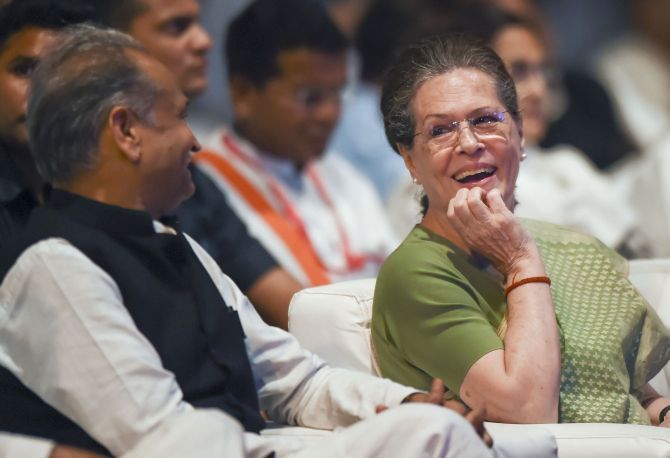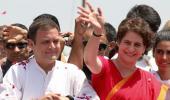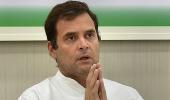The Congress will only survive if it can transform into something more like the BJP used to be: A coalition of strong state leaders held together by shared ideology or personal loyalty, suggests Mihir S Sharma.

The emerging contours of Indian politics have been clear for some time, but are even clearer after the elections in Maharashtra and Haryana.
It is often argued that the Bharatiya Janata Party is the 'new Congress', but not always with any clear understanding of what that means, and why.
It is quite trivially true that the BJP dominates the political sphere in much of India the way the Congress once did.
It is also self evidently true that in many states where the Congress provided the principal opposition to a regional party, such as Bengal or Odisha, that role has now been taken over by the BJP.
While six or seven years ago it was essentially a regional party of the north and west, it is now a truly national party.
But this springs from, and has implications for, the in-built structure of Indian politics.
The simple fact is that this is a federal union, and its national politics is hard-wired to reflect that fact.
In a country as organised as ours is, there are always two natural political forces in any state's politics: The centralising one and the federalising one.
These have two different approaches to many policy questions, and to the broader questions of narrative that also have a role to play in politics.
For decades, the centralising pole in our politics was the Congress and its ideology -- or, as the BJP would derisively say, its 'idea of India'.
This was essentially a con-social, compromising central state, with hard edges at the margins but generally soft.
Debates would be settled by a central authority in the party rather than through formal institutional structures.
Within many states, the party would run through a coalition of two groups.
First, elites who claimed to have a national consciousness -- whether because they were products of British India, or because they were national-level capitalists, or occupied certain spots on the local caste system.
And second, those who looked to the central power to protect them from rapacious ground level dominant castes.
The classical form of this would be, of course, the Brahmin-Dalit-Muslim-ST coalition that the Congress is constantly trying to rebuild in parts of the north.
The opposition to this centralising tendency would be provided by the parties of those ground-level dominant castes, often small landowners, supported by local (as opposed to national and global) capital.
These might variously be the Telugu Desam Party in Andhra Pradesh, the Lohia-ite 'socialists' in north India, or the BJP in Gujarat and some other states.
So what does it mean that the BJP today occupies the space of the Congress? It means that now, its own ideology of the nation has replaced the Congress's as the primary centralising pole in many states, and the BJP itself therefore is the national pole in most state polities.
It has extended its politics by roping in those of the 'backward classes' who were excluded from the gains won by dominant caste leaders -- OBCs who resented Yadavs in UP and Bihar, for example.
This allows it to form winning political coalitions that replicate those the Congress used to have, but without Muslims.
Logically, therefore, this means that in many states the opposition will continue to be provided by localising forces of one sort or another, backed as earlier by local capital.
This can provide a counterweight to the strong support of national capital for the centralising pole, reminiscent of how big business used to swing into line behind the Congress.
This is visible in these elections, if you look for it.
The Congress managed to put up a fight in Haryana when it began to behave like a local party, and allowed the Hoodas to create the local coalitions that they needed to reverse the BJP's gains (but not win).
It is also why, in Maharashtra, the Congress is now very much the junior partner to Sharad Pawar's Nationalist Congress Party.
And it is also why the BJP-Shiv Sena alliance is growing ever more uneasy.
For a sons-of-the-soil party like the Sena to be allied to a centralising force is extremely difficult for their politics.
When Aaditya Thackeray promises to defend Aarey, it is not just an amusing revelation of Sena powerlessness or a statement of its hypocrisy.
It is an attempt to navigate the basic contradiction of their alliance: In regionalist politics, an infrastructure project backed by national ambitions should not ride rough-shod over local objections.
The implications going forward are evident.
First, the BJP will try wherever possible to institutionalise the power of the Centre, since it now represents the centralising pole.
Thus, Narendra Damodardas Modi will argue for simultaneous elections and the finance commission will be told to de-prioritise states.
Second, the Congress will only survive if it can transform into something more like the BJP used to be: A coalition of strong state leaders held together by shared ideology or personal loyalty.
The Gandhis can continue to reign, but they certainly cannot rule any more.
And, finally, if state leaders do not understand that they have to unite at the central level to win concessions, they will continue to be institutionally diminished in New India.











